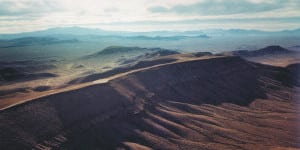
There is no funding for the proposed Yucca Mountain nuclear waste repository in Nevada in the omnibus appropriations bill Congress passed this week to keep the Energy Department and the rest of the federal government funded through September. The bill was awaiting President Donald Trump’s signature on Friday afternoon.
The Trump administration wants to restart DOE’s application to license Yucca Mountain with the Nuclear Regulatory Commission in fiscal 2018. The White House has proposed spending $120 million in the budget year that begins Oct. 1 on a combination of Yucca licensing activities and early work on interim storage sites for spent nuclear fuel generated by U.S. power plants.
The administration has not specified how it would divide and use that funding. A more detailed budget proposal is expected later this month.
In March, Sen. Dean Heller (R-Nev.) asked the leaders of the Senate Appropriations Committee not to include funding for Yucca Mountain in any 2017 spending bills. Like all the members of Nevada’s U.S. delegation, Heller staunchly opposes Yucca Mountain.
Yucca is intended to hold tens of thousands of tons of U.S. commercial and defense waste. The Obama administration canceled the program, turning instead to “consent-based siting” for separate repositories for government and civilian waste. Under President Donald Trump, though, DOE appears set to reverse course again.
“Yucca Mountain would cost billions while jeopardizing the health and safety of Southern Nevada and residents of almost every congressional district across the country. I worked to keep funds for this failed project out of the omnibus and will continue to fight any attempt to revive it,” Rep. Dina Titus (D-Nev.) said in a statement Monday noting the absence of fiscal 2017 funding for the project. “Nevadans have never supported this project and should not have a nuclear waste dump forced upon them. That is why Congress must pass my legislation to mandate that any repository have the consent of state, local, and tribal officials in the proposed area.”
While it cuts out Yucca Mountain, the $31 billion budget request for DOE does include $85 million for used nuclear fuel disposition, with $62.5 million directed toward “generic research and development activities,” according to the congressional explanatory statement on departmental funding.
At least “$14,250,000 shall be to continue research and development activities on behavior of spent fuel during storage, transportation, and [disposal], with priority on preparation activities for testing high-burnup fuel and postirradiation examination of spent fuel rods and on the direct [disposal] dry storage canister technologies,” the document says.
Roughly 75,000 metric tons of spent fuel is now stored at nuclear plants around the country, with another 2,000 tons produced annually. Congress in 1982 directed the Department of Energy to build a permanent repository for the waste, and five years later settled on Yucca Mountain as the location.
The Trump administration appears set to advance its predecessor’s plans for consolidated interim storage of spent fuel. Two companies have already submitted waste storage license applications with the Nuclear Regulatory Commission: Dallas-based Waste Control Specialists, which last month asked the NRC to suspend review of its West Texas project while the company finalizes its merger with rival EnergySolutions; and Holtec International, for a facility in southeastern New Mexico.
The congressional budget plan proposes $22.5 million for lntegrated Waste Management System operations, DOE’s multipart plan for managing both spent fuel and high-level radioactive waste. Under the Obama administration that program over a period of decades was to establish pilot facilities, interim storage sites for spent fuel, and finally one or more geologic repositories.
The Department of Energy and House Appropriations Committee had by deadline not responded to requests for detail on how the funding for used fuel operations and associated programs would be spent.